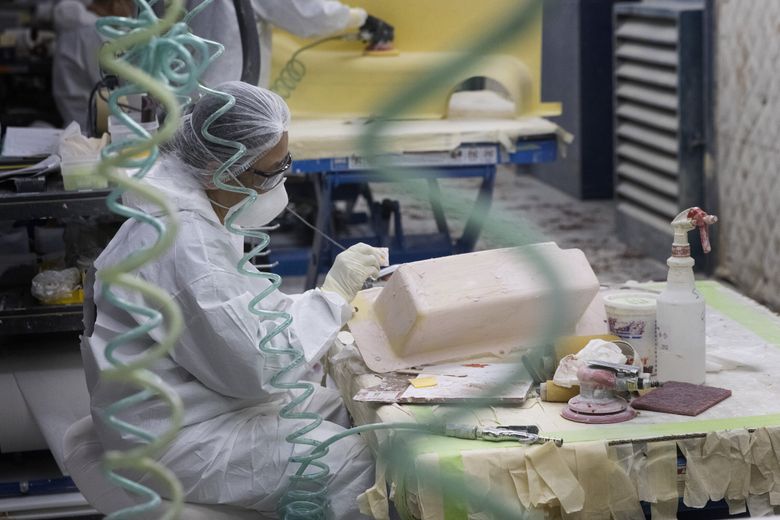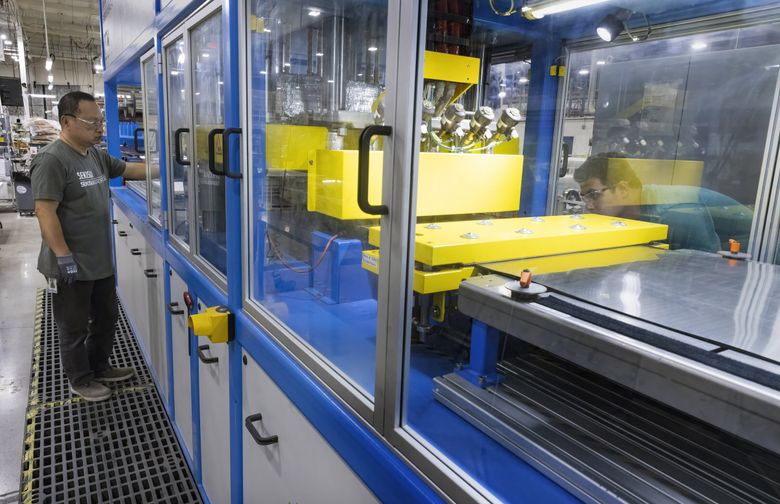Boeing & Aerospace
Business
What do Boeing and Airbus share? Parts shortages and a supplier crisis
July 23, 2024 at 6:34 pm

Inside Sekisui Aerospace’s facility in Renton, a worker meticulously fills depressions and sands off rough spots on a thermoset airplane component to prepare the surface for painting. This is the kind of... (Ellen M. Banner / The Seattle Times, 2023)

By
Dominic Gates
Seattle Times aerospace reporter
FARNBOROUGH, England — At the Farnborough Air Show this week, the aerospace industry is focused on a worldwide supply chain crisis, illustrated by the predicament of Renton-based Boeing supplier Sekisui Aerospace.
As work picked up last year after the pandemic downturn and a protracted stoppage when Boeing 787 deliveries were halted, Sekisui added 220 employees.
To do so, Sekisui CEO Daniele Cagnatel said he had to recruit, hire and train 407 people. Almost half left within two or three weeks of joining the company.
Due to the COVID- and 787-induced slowdown, Sekisui “lost years and years and years of experience,” Cagnatel said in an interview shortly before the Farnborough Air Show. “People who left the business left aerospace, and those people are gone.”
“It’s a very painful, steep curve to get people and get them to stay,” Cagnatel said. “Industries which are less taxing in terms of work are paying the same as aerospace manufacturers.”
His problems have been compounded by the unreliability of Boeing’s production rates, first with the 787 stoppage and now with the slowdown as Boeing works to fix its quality problems.
“You find yourself staffed up, with all the costs of hiring and training,” Cagnatel said. “Then you don’t have the volume, because the schedule moves to the right.”
It’s not just Boeing’s problem.
Late last month, Airbus CEO Guillaume Faury announced a 4% cut to projected jet deliveries this year, citing shortages of business-class seats, airplane structural parts and engines.
“We will have gliders in significant numbers by the end of the quarter,” Faury said, meaning completed jets parked outside with no engines available.
“We are spending more time, energy and human resources on supply chain management post-COVID than we ever did previously, and not by a small amount,” he added.
Farnborough 2024: Essential stories from the big air show
When Boeing balked at new jet, Airbus moved. Now the A321 will ‘make an awful lot of money’
Boss of biggest 777X customer wants Boeing fixed — with union help
Airbus, Boeing execs diverge in style, mood as aviation’s biggest event kicks off
With aviation’s future clouded, Airbus looks forward. Boeing holds on
Korean Air orders up to 50 Boeing 777X, 787 jets at Farnborough air show
The acute labor shortage has even hit Airbus itself.
At a panel discussion at the air show Tuesday, Delphine Bazaud, Airbus senior vice president and head of the industrial supply chain, said the European jet-maker has hired former butchers and bakers to work in its factories.
“It means we need to dedicate even more time for training and upskilling on the production line,” she said.
On the same panel, Ihssane Mounir, Boeing senior vice president for global supply chain and fabrication, offered an optimistic take on the moment the industry faces.
“We have an opportunity with the slowdown … to put the fundamentals in place,” he said.
Mounir pledged to support suppliers through their current difficulties.
To ensure reliable supply, he said Boeing can offer financial support where needed, send people to troubleshoot bottlenecks and help suppliers with planning and training. Boeing also is buying raw materials in bulk and selling them to suppliers at cost.
Mounir, who switched from being head of sales to fixing the supply chain 18 months ago, offered a kinder, gentler Boeing message to its suppliers after years of squeezing them on price.
“It really hinges on some very simple principles of building good relationships,” Mounir said. “And having the transparency and being present with the suppliers every step of the way.”
He said manufacturers must seize this moment of lower production to fix the supply chain for the future ramp-up.
“Demand is moving forward at a pretty good clip,” Mounir said. “We have to be ready for it.”

Carlos Amadeo, left, a lead thermoplastic technician at Sekisui Aerospace, and Maxwell Andrew, an innovation and development engineer, inspect an automated machine in Renton. The machine bonds pieces of carbon fiber composite to form a solid flat panel. Downline, other machines transform these panels into parts and interior structures for commercial aircraft and other industries. (Ellen M. Banner / The Seattle Times, 2023)
Hardest work a tough sell
On Tuesday, Mounir said the industry faces the worst supply problems “wherever you have the highest degree of touch labor, or the highest degree of craftsmanship and artisanship that goes into the work.”
That means skilled jobs like metal forging and casting to make such parts as engine turbine blades, said Kevin Michaels, an industry supply chain expert and founder of consulting firm Aerodynamic Advisory.
“This is tough, tedious work,” Michaels said. “People aren’t lining up to work in forging facilities.”
He said the shortage of business-class seats is a result of airlines designing sophisticated and bespoke seats stuffed with electronics that the regulators are slow to certify.
World events can have serious supply chain consequences too. The war in Ukraine has hit the supply of titanium, since most of the world’s supply comes from Russia.
Titanium is used extensively on widebody jets like the 787 and 777. The shortage of titanium would loom larger if not for the current low volume of widebody jet production, Michaels said.
He added that smaller “mom-and-pop shops” are diversifying away from commercial aerospace toward defense or space work after years of being forced to lower their prices.
“They are treated well by Blue Origin and SpaceX,” Michaels said.
The airplane manufacturers “have got to reset,” he said. “They need a rapprochement with their supply base.”
Mounir seems to recognize this.
“We can only meet our customer commitments and win new business if our supply base is healthy, stable and producing high-quality parts,” he said by email Tuesday. “We are committed to working side by side with our suppliers as genuine partners.”
Adam Pilarski, veteran industry analyst with consulting firm Avitas, said that both Boeing and Airbus will have to ease the pricing pressure on suppliers.
The jet-makers “have to realize that everybody has to make money,” he said.
Inevitably, he said, this means that the price of airplanes and of airplane tickets will also have to go up.
“The cost of lack of quality”
One fundamental problem clearly affecting industry hiring: While unionized Airbus and Boeing offer good pay and benefits, smaller suppliers in Washington state and elsewhere have traditionally paid much lower wages.
Post-pandemic, those wages have had to go up just to keep up with grocery stores and fast-food restaurants.
U.S. Aluminum Castings, based in Entiat, Chelan County, is one of the companies in the state’s delegation to the air show.
In an interview before the show, CEO Kristin Newberry said her company too cannot easily hire people to replace those who left in the past few years.
She said the work — cutting and grinding aluminum parts and pouring molten aluminum, working in a hot environment — is not appealing to the younger generation.
Newberry said she has raised wages to recruit people, with a wide range based on experience.
Still, the base salary at U.S. Aluminum starts at just $1 above the $16.28 minimum wage, she said.
On Tuesday’s panel, Mounir acknowledged that low wages at suppliers is a problem.
“It’s a reality,” he said. “The lower you go [in the supply chain], the more prominent the issue is in Washington.”
He said the industry must address this.
“I’ve learned very quickly that the cost of unpredictability and the cost of lack of quality and the cost of lack of reliability is much higher than any other cost,” he said.
As the industry struggles with the supply chain crisis, everyone on Tuesday’s panel agreed it will take time to recover.
Michaels of Aerodynamic Advisory certainly thinks so.
“It’s a five-year process to work our way out of this situation,” he said.
seattletimes.com |







